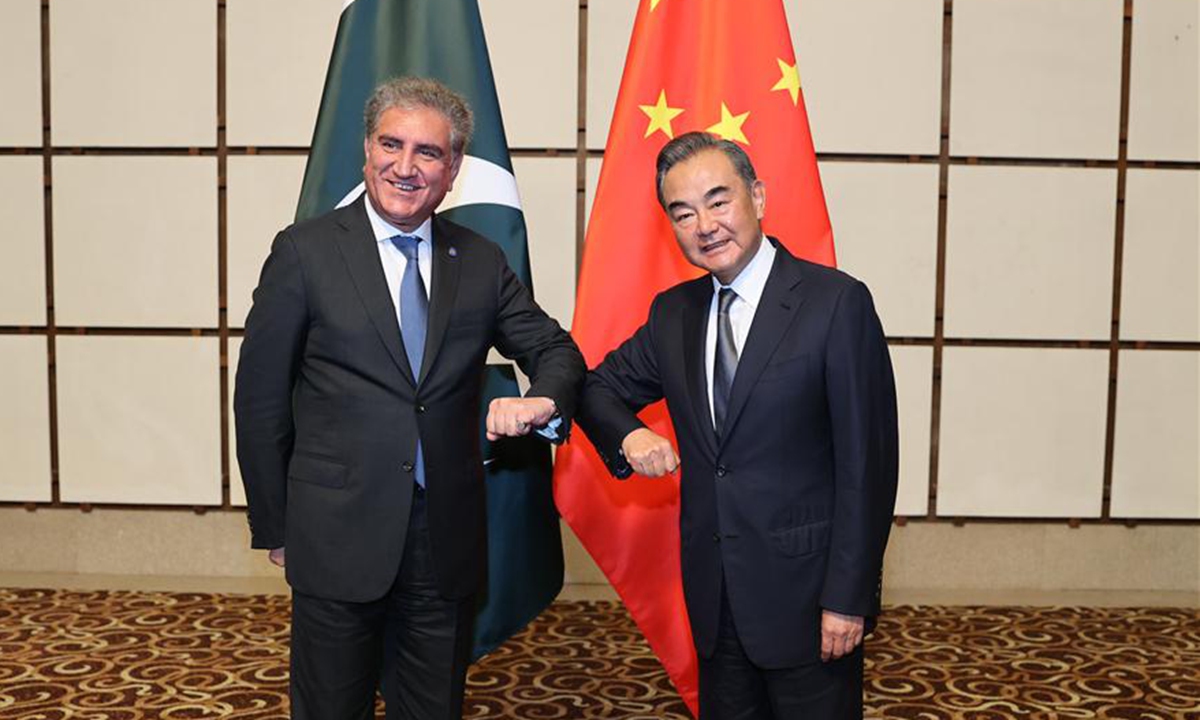India misinterprets China-Pakistan strategic dialogue
By Zhao Gancheng Source: Global Times Published: 2020/8/23 23:38:48

Chinese State Councilor and Foreign Minister Wang Yi (right) holds the second round of strategic dialogue between China and Pakistan with Pakistani Foreign Minister Makhdoom Shah Mahmood Qureshi in south China's Hainan Province on Friday. Photo: Xinhua
Chinese State Councilor and Foreign Minister Wang Yi and Pakistani Foreign Minister Makhdoom Shah Mahmood Qureshi held the second round of China-Pakistan Foreign Ministers' Strategic Dialogue in South China's Hainan Province on Friday.
China and Pakistan in November 2018 elevated the China-Pakistan Strategic Dialogue to the foreign ministers' level.
Against the backdrop of China-India border tensions, and days after the first anniversary of India's revocation of Jammu and Kashmir's special status, India may see the dialogue between China and Pakistan as a strategic alliance targeting India. However, based on China's current stance in South Asia, China hopes to deal with its frictions with India bilaterally. There is no need for China to build such an "alliance." China has sufficient capability, and leverage to deal with India on its own.
In terms of Kashmir, the Chinese side reiterated that "the Kashmir issue is a dispute left over from history between India and Pakistan, and China opposes any unilateral actions that complicate the situation."
In response to China's stance, Indian External Affairs Ministry spokesperson Anurag Srivastava on Saturday said India rejected a reference to Jammu and Kashmir in the joint press release and said it was tantamount to interference in India's internal affairs, Hindustan Times reported.
Such a response from New Delhi was not unexpected. India insists on its position on Kashmir no matter what the relevant stances of China, Pakistan and the international community are. In fact, India's removal of Kashmir's special autonomous status is beyond India's internal affairs. This is because Kashmir is a disputed region between India and Pakistan which is widely recognized by the international community. Furthermore, after revocation of its special autonomous status, the custom and life styles of local residents, especially Muslims, will be greatly impacted. India's position in terms of the statement on Kashmir in the joint press release will not affect China's stance on this disputed region.
Srivastava on Saturday also reiterated India's opposition to the China Pakistan Economic Corridor (CPEC), saying it passes through "the territory of India that has been illegally occupied by Pakistan." New Delhi has spared no effort in thwarting the construction of the CPEC, and opposed and demonized the China-proposed Belt and Road Initiative (BRI), as the CPEC is an important component of the BRI. The CPEC makes India feel threatened in terms of strategic and national security. Although China has clarified that CPEC is only an economic project, and will not pose any threat to India's security, these assurances have been in vain and cannot alter India's bias. In this context, New Delhi will object to any improvement on the project.
China will not abandon the CPEC just because of India's opposition. On the contrary, China will keep promoting it. Given China's strong national strength as well as its comprehensive cooperation with Pakistan, India can hardly hinder the CPEC's development.
While some Western countries, led by the US, have repeatedly provoked China when it comes to China's internal affairs including those of Hong Kong and Taiwan, Pakistan on Friday reaffirmed its firm support for China's core interests and issues of major concern, such as those related to Taiwan, Xinjiang, Tibet and Hong Kong. This has been Pakistan's consistent position on these issues.
Both sides also reaffirmed their commitment to support multilateralism, and opposition to unilateralism, protectionism and coercive practices and support the WHO to play a leading role in global public health governance. While the US has withdrawn from some of international organizations, and is shunning its responsibility as a great power, the statement by China and Pakistan is of great significance to the international community in jointly fighting the pandemic and global development. It also underlines China's image as a responsible power.
The author is a research fellow at the Shanghai Institute for International Studies. opinion@globaltimes.com.cn
Posted in: ASIAN REVIEW